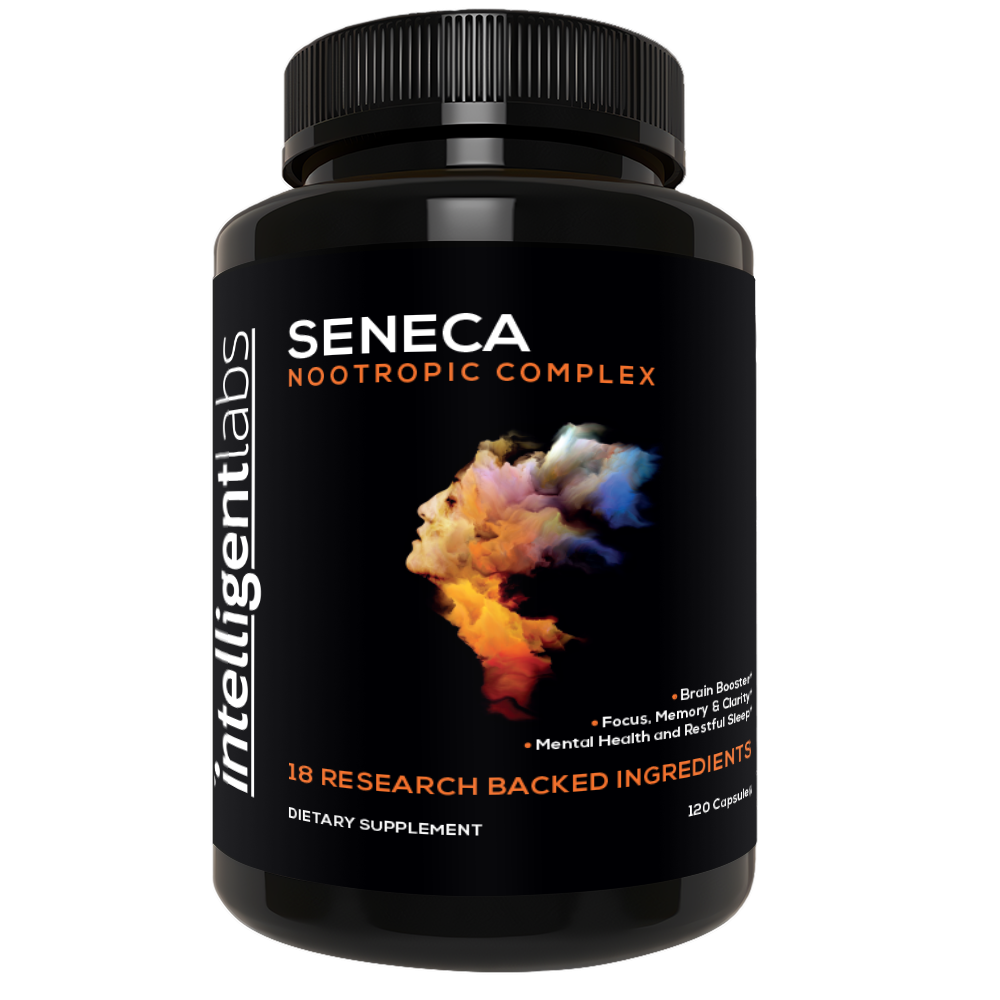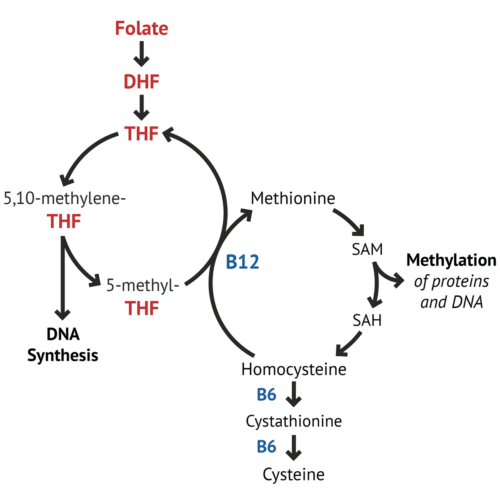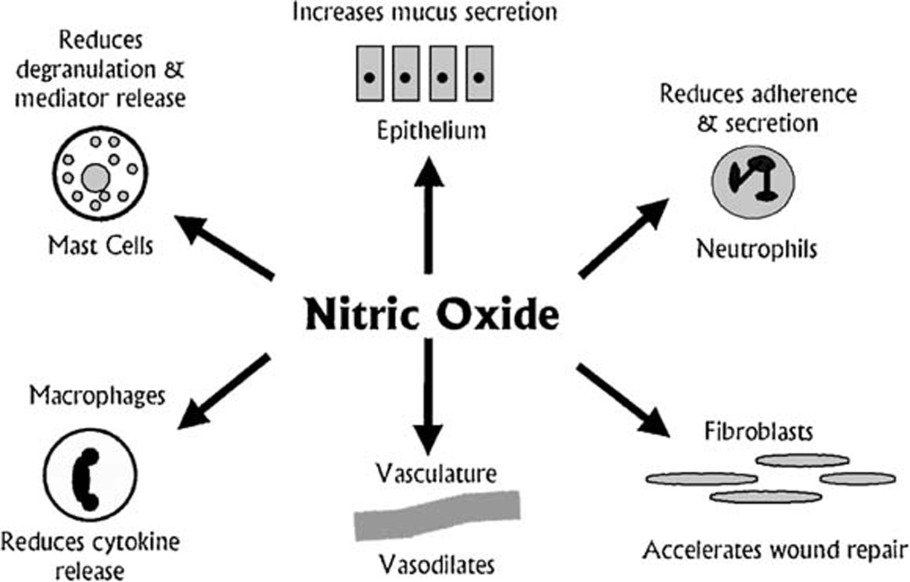If you’ve been struggling with low energy levels, lack of focus, and mood swings, then you may have low vitamin B12 levels – or maybe even a deficiency! If so, this article is for you. Scroll down to find out more about this natural nootropic vitamin and why we added it to our Seneca Nootropic Complex.
Table of Contents
What is Vitamin B12?
Vitamin B12, aka Cobalamin, is one of 8 B-complex vitamins. These are water-soluble and contribute to many life-sustaining functions in the body. But Vitamin B12 is unique in that it’s the only vitamin that contains the biologically rare element, Cobalt, hence the name Cobalamin.
There are 4 different forms of Vitamin B12 (1):
- Cyanocobalamin (CNCbl)
- Adenosylcobalamin (AdCbl)
- Hydroxocobalamin (OHCbl)
- Methylcobalamin (MeCbl)
Cyanocobalamin is synthetic and most commonly found in B12 supplements and multivitamins.
The other 3 forms are naturally bioidentical to the B12 forms that are found in animal-based food and human tissue. They are safer and more readily bioavailable as compared to cyanocobalamin. When choosing B12 supplements, it’s best to choose a product that contains any of these 3 forms (MeCbl / AdCbl / OHCbl) rather than CNCbl.
What is Vitamin B12 good for?
According to the European Food Safety Authority, Vitamin B12 contributes to the following (2):
- Energy-yielding metabolism
- Nervous system health
- Normal homocysteine metabolism
- Psychological function
- Red blood cell formation
- Immune system health
- Reduction of tiredness and fatigue
- Cell division
What makes Vitamin B12 a powerful nootropic?

Vitamin B12 is important for brain and central nervous system health. It plays an important part in both the Folate Cycle and Methylation. It’s also really important for breaking down odd-chain fatty acids and as an intracellular antioxidant.
Each of these 3 roles below needs a slightly different active form of B12 – they are adenosylcobalamin, hydroxocobalamin, and methylcobalamin.
1) Methylation
B12 is a vital cofactor for the enzyme Methionine Synthase. This turns homocysteine back into methionine, converting it into SAMe.
Consequently, it then transfers methyl groups around the body. The type of B12 used in the methylation cycle is methylcobalamin.
Methylation is vital for the production of DNA and RNA, as well as some hormones, gene expression, and the production of neurotransmitters, including:
- Serotonin
- Dopamine
- Adrenaline
- Noradrenaline
- Melanin
- AcetylCholine
If there is a deficiency in B12, it can lead to problems producing any of these neurotransmitters, which are vital for cognitive function.
Because of methylcobalamin’s important role in methylation, we added 500mcg of this form of Vitamin B12 to every serving of Seneca Nootropic Complex. For more information on nootropics, read our blog post on nootropics.

B12’s role in the Folate Cycle means it’s also necessary to produce Biopterin (BH4), which is then used to produce Nitric Oxide from Arginine.
Nitric oxide’s role
Nitric Oxide is vital for a huge number of beneficial processes in the body, including relaxing blood vessels and increasing blood flow around the body.
If there is a deficiency in B12, then we can’t produce enough BH4, and that can lead to Nitric Oxide turning into superoxide and then peroxynitrite, which is extremely toxic to cells (3, 4).

In fact, B12’s ability to reduce levels of both peroxynitrite and homocysteine in the methylation cycle and nitric oxide production is key to its benefits in the brain and central nervous system. Excessive homocysteine and peroxynitrite are linked to many chronic health conditions, including dementia and cardiovascular disease.
The latest research is also showing that B12 can directly act as an intracellular antioxidant by counteracting free radicals both as reactive oxygen species (ROS) and reactive nitrogen species (RNS). RNS derives from nitric oxide, so peroxynitrite is an RNS. B12 can reduce peroxynitrite by producing BH4, and also directly counteracting it as an antioxidant (5, 6).
B12 can also directly reduce the production of inflammatory cytokines. The specific type of B12 that helps to stop peroxynitrite forming is hydroxocobalamin (7).
2) Breaks down Methylmalonic Acid (MMA)
B12 helps break down odd-chain fatty acids and some amino acids in succinyl-Coa, which can be used for energy. However, when there is insufficient B12, a byproduct called Methylmalonic acid builds up.
MMA is toxic to cells. It’s known to cause damage to the mitochondria and directly to neurons (8, 9). The specific type of B12 used to break down odd-chain fatty acids is adenosylcobalamin.
3) Neuronal Health
B12’s ability to remove toxic substances, which are known to be neurotoxic, is thought to be a major part of why B12 deficiencies are associated with so many brain and Central Nervous System problems.
B12’s role in methylation also makes it essential for the production of choline and therefore phosphatidylcholine, which is needed for the production of myelin sheaths. This means B12 deficiencies are also associated with myelin sheath problems, such as multiple sclerosis.
What are examples of B12 food sources?
The human body does not make vitamin B12, so we need to take it from food. It is widely available in many animal-based foods, such as meat, liver, seafood, eggs, milk, and other dairy products (10).
Who’s at risk for Vitamin B12 deficiency?
Vegans and vegetarians are at risk for vitamin B12 deficiency. Fortunately, there are foods fortified with B12, this includes breakfast cereals and nutritional yeasts. Additionally, many multivitamins also include B12 in their formulation.
Another group of people at risk for B12 deficiency are older folks. Malabsorption becomes more common the older you get. In fact, about 3% to 43% of older adults suffer from B12 absorption, most likely due to a decrease in stomach acidity which is necessary to remove B12 from proteins in food (11).
Final Words
Many studies done on brain and nervous system health used B12 in methylcobalamin form. We specifically chose methylcobalamin as our Seneca ingredient because it can be used for essential bodily processes without further conversions. With B12 and all the other natural nootropics combined in Seneca, you can finally enjoy having more focus and energy throughout the day.




